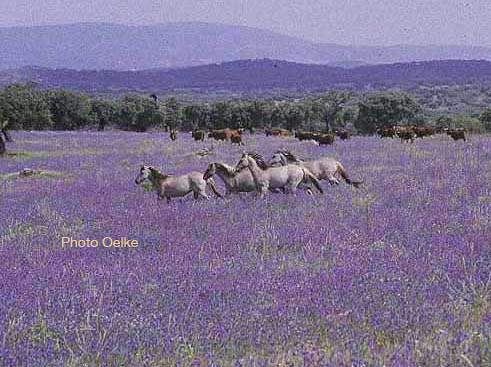TOTAL POPULATION TODAY

Semi-wild band of Sorraias in Portugal's Alto Alentejo
IS TODAY'S SORRAIA POPULATION SUFFICIENTLY LARGE?
How many Sorraias still exist? Has the situation improved?
The situation has improved to a degree as far as numbers are concerned, but there is a grey zone because many are sold without the new owners being recorded. There are probably still not many more than around 200 head the world over, but it is difficult to keep count of them. Over the last years, quite many foals were born in Portugal and outside of it, but there are always some that are sold and of which one cannot keep track.
A different management in Alter do Chão of their Sorraia herd (Portuguese National Stud) since 1998 has resulted in a better reproduction rate (they now have a stallion running in the fields with their mares; before that, they tried to hand-breed these primitive horses, with very poor results). Nowadays their mare herd numbers around 20 head, almost twice the size than what it was 15 years ago; the same holds true with some other breeders in Portugal. In Germany, some foals were born, in the zoological garden in Springe as well as privately. In Germany as well as in Portugal, horses were sold and basically lost to the conservation effort. Unfortunately, a relatively high percentage of atypical horses were born in Germany, conformation-
wise and colorwise.
The total number of possibly 200 head includes foals and youngsters as well as other non-reproducing horses. The total count of reproducing mares is probably less than 100, which is of course alarmingly few, and nowhere near what would ensure the survival of the Sorraia, the most primitive Iberian horse we have today! If one considers the extreme inbreeding these horses had to suffer, their survival is more than just at risk.



